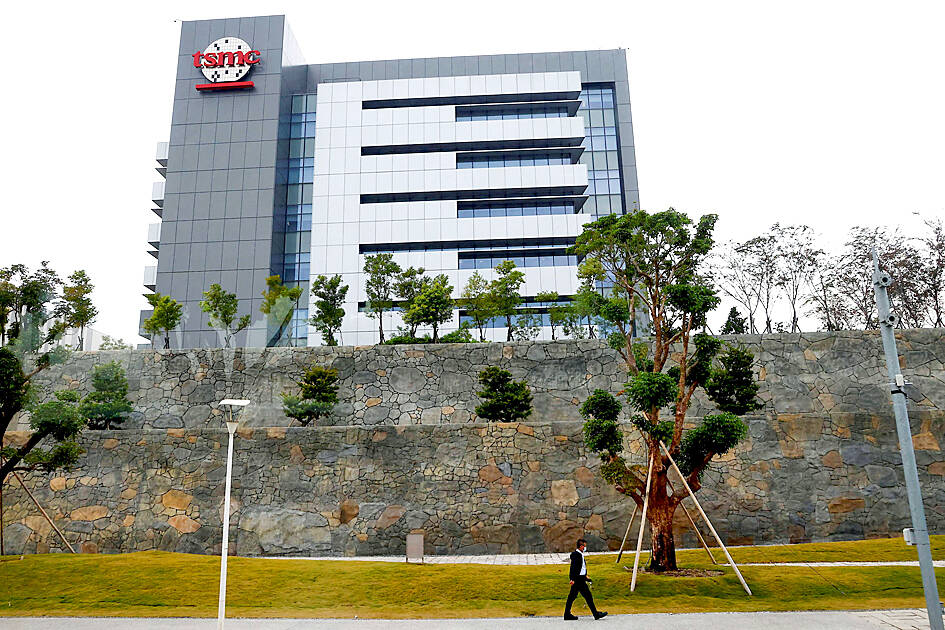Taiwan Semiconductor Manufacturing Co (TSMC, 台積電) yesterday said it has obtained permanent authorization from the US government, confirming that the items and services subject to US export control regulations could continue to be provided to TSMC’s Nanjing fab without the need for vendors to get individual licenses.
Issuance of the validated end-user (VEU) authorization maintains the status quo for production of semiconductors at its Nanjing fab, TSMC said in an e-mail.
In October 2022, the chipmaker secured a one-year general authorization from the US government, which allows TSMC to continue its fab’s operations in Nanjing, China, the chipmaker said.

Photo: Ann Wang, Reuters
The general authorization has been renewed and extended to until May 31 this year, it added.
TSMC operates a 12-inch fab in Nanjing utilizing 16-nanometer technology and less advanced 28-nanometer process technology.
It said it is expanding its 28-nanometer chip capacity there to address increasing demand from customers in China.
“Recently, the US Department of Commerce issued a Validated End User authorization to TSMC Nanjing Co Ltd (台積電 (南京) 有限公司),” TSMC said. “This formal VEU authorization replaces ad hoc letter authorizations the Commerce Department had issued previously since October 2022.”
To prevent China from advancing its semiconductor manufacturing capabilities, the US has tightened export controls for advanced computing integrated circuits (ICs), computer commodities that contain such ICs and certain semiconductor manufacturing items. It also tightened controls on transactions involving items for supercomputer and semiconductor manufacturing end-uses.
The new controls added new license requirements for items subject to the US Export Administration Regulations that would be sold to a semiconductor fabrication facility in China, as well as on US persons’ activities supporting such facilities or semiconductor manufacturing items.

GROWING OWINGS: While Luxembourg and China swapped the top three spots, the US continued to be the largest exposure for Taiwan for the 41st consecutive quarter The US remained the largest debtor nation to Taiwan’s banking sector for the 41st consecutive quarter at the end of September, after local banks’ exposure to the US market rose more than 2 percent from three months earlier, the central bank said. Exposure to the US increased to US$198.896 billion, up US$4.026 billion, or 2.07 percent, from US$194.87 billion in the previous quarter, data released by the central bank showed on Friday. Of the increase, about US$1.4 billion came from banks’ investments in securitized products and interbank loans in the US, while another US$2.6 billion stemmed from trust assets, including mutual funds,

Micron Memory Taiwan Co (台灣美光), a subsidiary of US memorychip maker Micron Technology Inc, has been granted a NT$4.7 billion (US$149.5 million) subsidy under the Ministry of Economic Affairs A+ Corporate Innovation and R&D Enhancement program, the ministry said yesterday. The US memorychip maker’s program aims to back the development of high-performance and high-bandwidth memory chips with a total budget of NT$11.75 billion, the ministry said. Aside from the government funding, Micron is to inject the remaining investment of NT$7.06 billion as the company applied to participate the government’s Global Innovation Partnership Program to deepen technology cooperation, a ministry official told the

Taiwan Semiconductor Manufacturing Co (TSMC, 台積電), the world’s leading advanced chipmaker, officially began volume production of its 2-nanometer chips in the fourth quarter of this year, according to a recent update on the company’s Web site. The low-key announcement confirms that TSMC, the go-to chipmaker for artificial intelligence (AI) hardware providers Nvidia Corp and iPhone maker Apple Inc, met its original roadmap for the next-generation technology. Production is currently centered at Fab 22 in Kaohsiung, utilizing the company’s first-generation nanosheet transistor technology. The new architecture achieves “full-node strides in performance and power consumption,” TSMC said. The company described the 2nm process as

JOINT EFFORTS: MediaTek would partner with Denso to develop custom chips to support the car-part specialist company’s driver-assist systems in an expanding market MediaTek Inc (聯發科), the world’s largest mobile phone chip designer, yesterday said it is working closely with Japan’s Denso Corp to build a custom automotive system-on-chip (SoC) solution tailored for advanced driver-assistance systems and cockpit systems, adding another customer to its new application-specific IC (ASIC) business. This effort merges Denso’s automotive-grade safety expertise and deep vehicle integration with MediaTek’s technologies cultivated through the development of Media- Tek’s Dimensity AX, leveraging efficient, high-performance SoCs and artificial intelligence (AI) capabilities to offer a scalable, production-ready platform for next-generation driver assistance, the company said in a statement yesterday. “Through this collaboration, we are bringing two